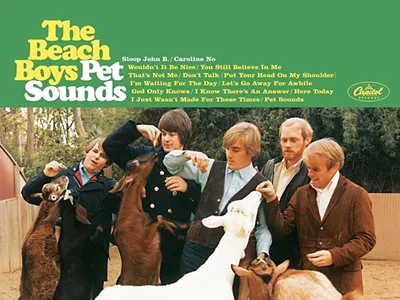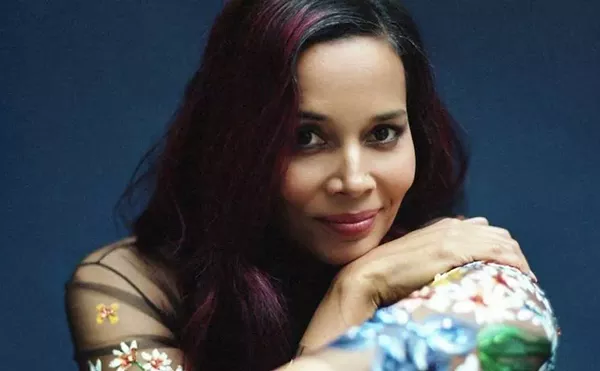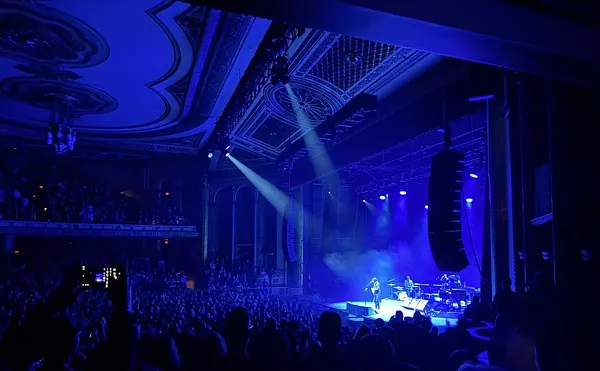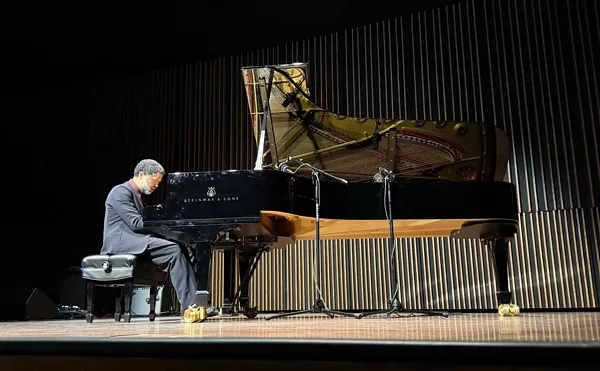
Audio By Carbonatix
[
{
"name": "GPT - Leaderboard - Inline - Content",
"component": "35519556",
"insertPoint": "5th",
"startingPoint": "3",
"requiredCountToDisplay": "3",
"maxInsertions": 100,
"adList": [
{
"adPreset": "LeaderboardInline"
}
]
}
]
As increasingly difficult as it has become to get people excited about jazz, a genre perceived as intimidating and therefore too easily dismissed, Kamasi Washington can't seem to help but do just that. You may know him from his most recent contributions to Kendrick Lamar's powerhouse political hip-hop album To Pimp a Butterfly, but the 35-year-old tenor saxophonist has been playing and honing his particular sound for many years now, adding to his own personal repertoire by performing with an array of groups varied in style, including jazz legends Wayne Shorter, Herbie Hancock, and Horace Tapscott as well as contemporary artists all across the R&B, hip-hop, and soul spectrums, from Lauryn Hill and Nas to Snoop Dogg and Chaka Khan. Most recently, he's been associated with Flying Lotus (who also happens to be the grandnephew of Alice Coltrane); Washington's sprawling, moving debut album, The Epic, was released on Flying Lotus' independent label Brainfeeder.
The Epic feels like it could be a bit of an overstated choice for an album title in 2015, but Washington's release has more than earned its name. A 172-minute, triple-disc tour de force, The Epic is, in some ways, an epistle to the spirituality and expression brought to jazz by John Coltrane; the man is, after all — by Washington's own admission — his biggest influence. The Epic is very much engaged in a conversation with the jazz canon, but also brings elements of soul, funk, fusion, and even psychedelic to the table, backed with a full string orchestra and choir.
As indebted as it is to the masters of the genre, thematically The Epic exercises yet another arm of Washington's many interests: anime and martial arts movies. When he was working on what would become the first track, aptly titled "Change of the Guard," Washington says he started having a dream in which a guard who has no family or home guards a gate on top of a mountain. At the bottom of the mountain is a village, and all the villagers do is train to challenge the guard. One day, four of the villagers decide to climb up the mountain to challenge him; he sees something special in one of them, and allows himself to be overcome. Washington had this dream something like five times in a row — he started to enjoy having it so much that he would actually go to bed hoping to have that dream again. Eventually, other songs started making their way into his nightly visions, and soon he was dreaming about all 17 songs that would ultimately become The Epic — each one had some sort of connection to the initial story about the guard. It's an epic, you see, not simply due to the sheer breadth of sound, but in poetic scope as well.
Washington has been around music his entire life. He cites 3 as the age he started playing, and sometime shortly after, before age 6, he received his first instrument: a drum set. He learned clarinet at 9, and then added the saxophone family to his sonic skill set just a few years later. From there, he continued to develop his skills in school bands and later studied ethnomusicology at UCLA, where he grew his knowledge of non-Western musical cultures. Washington, born and bred in Los Angeles, is also a prominent member of the West Coast Get Down, a West Coast musical collective that includes many of the players in his band, the Next Step.
In jazz — and other genres too, but it seems to be a hallmark of great jazz — songs exist as so many different versions of themselves each time they are performed live. The Epic was released last year, but it was recorded back in 2011, so the songs have had plenty of time to settle into themselves, shift around, and reveal new depths, and a live setting is the perfect place to experience the majesty of The Epic's many pulsing, soaring, expansive sounds.
We get the chance to have this experience for ourselves when Kamasi Washington and the Next Step play Ann Arbor's Michigan Theater on Friday, Sept. 30. In advance of what is sure to be an awe-inspiring performance, we spoke with Washington about finding his musical voice, the state of jazz in Los Angeles, and much more.
Metro Times: Is there something about tenor saxophone in particular that you like?
Kamasi Washington: I think you have an inner voice, these sounds you hear inside yourself, and for me the tenor saxophone is that sound. When I started playing saxophone, I started on alto actually, and it definitely felt like this is my instrument. Then when I switched to tenor, it was like, "OK, this is my voice on this instrument."
MT: In your view, what are your biggest influences?
Washington: I'd say John Coltrane is probably my biggest influence. You know as a musician how you discover people and you get a little bit enthralled with them, almost obsessed. It lasted longer with John Coltrane for me than with anyone else. [But] I have been influenced by a lot of different people — Stravinsky, Charlie Parker, Wayne Shorter, Miles Davis, Freddie Hubbard, Lee Morgan [to] James Brown and Michael Jackson.
MT: I read in one interview that you said you've had experiences where people say, "I hated jazz before I heard you guys!'" and your response to that is, "You didn't hate jazz before you heard us, you hated the idea of jazz." What do you mean by 'the idea of jazz'?
Washington: I mean people's ideas. They have this notion of what the music is — it's stuffy music that's overly intellectual, that it's not made for simple enjoyment. They have this idea that it's like reading a textbook, or something like that. But when they hear the music, they realize, 'Oh, that's not really what it is.' It's about self-expression and freedom and creativity and being in the moment, and when they hear that part of the music, then they're drawn to it. But they have this idea [that] they don't like of the music as a task to listen to. There's this idea that there's certain types of music that you have to prepare yourself and get educated, but the reality of music is that the most educated musicians, the most brilliant musicians, when they're listening to music, they're not listening to it on a level like that. I mean, I don't when I'm just listening to music. I can analyze music, but if I go to a concert to hear someone play, I'm not doing that. I'm just listening to it and enjoying it. I'm not really trying to analyze what he's doing. That's not how I think anyone who enjoys music consumes it.
MT: You have been getting a lot of press about revitalizing modern jazz. How do you feel about such claims?
Washington: I feel like we're bringing the music to places where it doesn't normally go. I mean, jazz is a very wide term — there's so many different types of jazz, so many different approaches. I feel like what I and the band that I play with do, we have a style and approach to what we call jazz that is different, a style and approach that comes from LA, and hadn't been realized to that degree. It had been overlooked and a lot of people hadn't heard it, so it makes me happy to turn people onto it. You know, music is an internal thing that you want to share with the outside world. I think its biggest function is that it brings people together. In the end, you can really only create the music that you hear in your head and feel inside you, but you hope that it reaches people, to be able to go out and reach people that maybe wouldn't have had this experience of jazz — which is a bit of an understatement because there is jazz in all styles of music, those elements that we call jazz: the improvisation, harmonies, rhythms, all those things, you hear them in other music styles. People are using jazz in different forms, but it opens them up to the core of the music [and leads to] people like John Coltrane, Pharoah Sanders, Alice Coltrane, [and] introducing them to those people is a cool thing to do.
MT: You said you are taking jazz into places it hasn't gone before. Can you name one jazz album you would recommend to people who don't have any background or interest in it, but because of your music might have become interested?
Washington: So if someone likes my music, an album they might like? My album goes a lot of different places. Jazz is a wide thing, so it's hard to [pick] just one album that if you like my album, you'll definitely like this. It depends on what part of my album you're really into. John Coltrane, Africa/Brass, is a good one. There's Lee Morgan, The Gigolo. Kenny Garrett, Songbook. Art Blakey, Mosaic.
MT: You had mentioned your music is LA jazz, which doesn't get anywhere the amount of attention that a place like New York does. Why do you think that has happened?
Washington: LA is such a big city, famous for Hollywood and movies, so much of the attention for Los Angeles gets placed toward that, that the more artistic side of the city gets trapped in the shadows. It's a reality that New York is the mecca of jazz, that people who love jazz from around the world typically go to New York. It's the place you go to make your mark on music. But LA is [such] a big city [that] there is so much opportunity within it that you can as musicians, stay there, make a mark, and have a career there; whereas other cities, if you're not gonna go to New York, you're not really gonna play. It's more like you have to go to New York, or you have to go somewhere, or you're not gonna do this; whereas in LA, you have a choice. You don't HAVE to leave.
MT: I see that you studied with Gerald Wilson, who went to school in Detroit and graduated from Cass Tech.
Washington: Yeah! I played on [several] of Gerald Wilson's records. He talked a lot about Detroit. He's from Mississippi, and then he moved to Detroit, [which] was the first integrated city, back in the '30s when he was there. He got accepted into Cass Tech, and he came from Mississippi, where it was fully segregated. [But at] Cass Tech, he was going to school with people of all different races. That was an amazing thing for him. Anyone who is into music, and has a broad opinion of music, has to acknowledge Detroit and all the music that came from there. Motown, and so much of modern music has its origins in Detroit. I've never lived there, and I don't have any deep connection to the city in that sense, but a lot of the music I've grown up listening to is from there. The Detroit Jazz Festival is one of the coolest jazz festivals I've ever been to — it's an amazing thing. I couldn't imagine Los Angeles shutting down downtown LA for a music festival.
MT: Another person who moved to Detroit and has become connected to the city that you recorded with is Phil Ranelin. What was recording that album, Perseverance, like?
Washington: It was amazing. Phil Ranelin is a historic figure; he came up with Freddie Hubbard. He's such a pillar to the Los Angeles jazz scene as well. He's from Indianapolis, right? He's not from Detroit?
MT: You're right. He's from Indianapolis, but he moved here.
Washington: He puts noodles in his chili, so that's how you know! That's an Indiana thing. But yeah, that was an amazing experience, [along with] Henry Franklin, another staple of the jazz scene in Los Angeles, and Big Black. Tony Austin who played on my record, he's also playing on that session. Ranelin is an amazing composer, he's a real supporter of the music. He's one of those guys that was around and always reached out to young musicians and was always an open door to us, to give opportunities to young guys, extending an olive branch and passing on the music. To play on his record was an honor.
MT: If there's one thing you want listeners to take away from The Epic, what might that be?
Washington: I don't [necessarily] have a specific goal in that sense. I feel like music is experienced by each person in their own individual way. What you're really doing is giving each person a window into your psyche, into who you are, and they can take from that whatever they need. It's more like here is who I am, here is what I feel, here is what I see, here is what I have to give, and you take from that what you can.
Peer into the souls of Kamasi Washington and the Next Step when they perform on Friday, Sept. 30 at the Michigan Theater; Starts at 8 p.m.; 603 E. Liberty St., Ann Arbor; tickets.ums.org/; tickets range from $30-$60.





